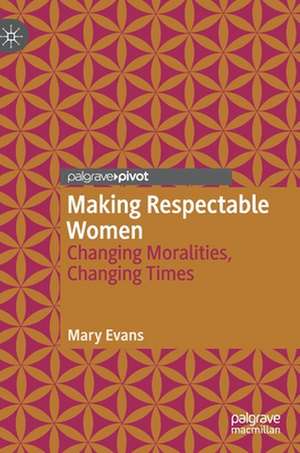Making Respectable Women: Changing Moralities, Changing Times
Autor Mary Evans Contribuţii de Kimberley Beachen Limba Engleză Hardback – 17 dec 2020
Making Respectable Women makes use of archive material to show how the changing definition of a moral and social concept can have an impact on both the behaviour and the choices of individuals and the operations of institutional power. It will be of interest to students and scholars across the humanities and social sciences.
Preț: 449.53 lei
Nou
Puncte Express: 674
Preț estimativ în valută:
86.03€ • 93.41$ • 72.26£
86.03€ • 93.41$ • 72.26£
Carte tipărită la comandă
Livrare economică 22 aprilie-06 mai
Preluare comenzi: 021 569.72.76
Specificații
ISBN-13: 9783030606480
ISBN-10: 3030606481
Pagini: 108
Ilustrații: XIV, 108 p. 6 illus., 1 illus. in color.
Dimensiuni: 148 x 210 mm
Greutate: 0.3 kg
Ediția:1st ed. 2020
Editura: Springer International Publishing
Colecția Palgrave Pivot
Locul publicării:Cham, Switzerland
ISBN-10: 3030606481
Pagini: 108
Ilustrații: XIV, 108 p. 6 illus., 1 illus. in color.
Dimensiuni: 148 x 210 mm
Greutate: 0.3 kg
Ediția:1st ed. 2020
Editura: Springer International Publishing
Colecția Palgrave Pivot
Locul publicării:Cham, Switzerland
Cuprins
1. The Context.- 2. Victorian Values.- 3.Making the ‘Modern’ Woman.- 4. The Right Body.- 5. Judging Women.
Notă biografică
Mary Evans is Leverhulme Emeritus Professor, Department of Gender Studies, London School of Econimics and Political Science, UK
Textul de pe ultima copertă
“A fascinating gem of a book on the history of respectability as a form of social control, bursting with historical insights about how women have been judged, and the enduring impacts of cultures of judgement in shaping unequal lives today.”
Imogen Tyler, Professor and Head of the Department of Sociology, Lancaster University, UK
This book studies the ways in which the assessment of being or not being ‘respectable’ has been applied to women in the UK in the past one hundred and fifty years. Mary Evans shows how the term ‘respectable’ has changed and how, most importantly, the basis of the ways in which the respectability of women has been judged has shifted from a location in women’s personal, domestic and sexual behaviour to that of how women engage in contemporary forms of citizenship, not the least of which is paid work. This shift has important social and political implications that have seldom been explored: amongst these are thegrowing marginalisation of the validation of the traditional care work of women, the assumption that paid work is implicitly and inevitably empowering and the complex ways in which respectability and conformity to highly sexualised conventions about female appearance have been normalised.Making Respectable Women makes use of archive material to show how the changing definition of a moral and social concept can have an impact on both the behaviour and the choices of individuals and the operations of institutional power. It will be of interest to students and scholars across the humanities and social sciences. Imogen Tyler, Professor and Head of the Department of Sociology, Lancaster University, UK
Mary Evans is Leverhulme Emeritus Professor, Department of Gender Studies, London School of Econimics and Political Science, UK
Caracteristici
Demonstrates the way in which the social norm 'respectability' is used to control/influence behaviour Uses archive material to discuss the ways in which women’s respectability was defined in the late nineteenth and early twentieth centuries through UK societies for the emigration of women to the colonies Argues that the identification of a woman as ‘respectable’ has always been an expression of power
